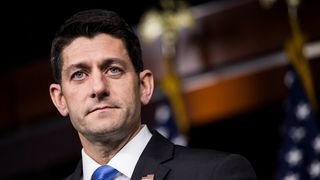The Republican Party is starting to fracture. Republicans railed against the Affordable Care Act – better known as Obamacare – throughout Barack Obama’s presidency, but they are now struggling to unite behind their bill to repeal and replace it.
Paul Ryan, the Republican Speaker of the House and champion of the new bill, known as the American Health Care Act, faces a difficult political situation offering many risks and few rewards. With Democrats unified in opposition to the bill, Ryan can lose no more than 21 of the 237 Republican votes if the bill is to pass the House. Yet sceptical members of the far-right House Freedom Caucus, which numbers about 40, could sink a bill they have labelled ‘Obamacare 2.0’.
If Ryan manages to keep the Republican conference together and get the bill through the House, Senate Majority Leader Mitch McConnell can only afford one or two defections among Republican senators to get the bill out of the upper house and onto the president’s desk. Three of the most conservative Senators – Mike Lee, Ted Cruz and Rand Paul – are unhappy with the current bill and instead demand a “full repeal” of Obamacare. Meanwhile, Republican senators Dean Heller, Susan Collins and Tom Cotton have also expressed doubts about the bill, with Cotton warning that it “can’t pass the Senate without major changes”.
President Trump has turned on the full charm offensive by inviting sceptical Republicans to dine with him and bowl at the White House’s two-lane Truman Bowling Alley, but there is little indication that this will work. Republicans who vote for the bill will have to defend charges it is a big tax cut for the wealthy that is projected to leave 14 million Americans uninsured next year. Wavering Republicans face pressure to oppose the bill from right-wing advocacy groups including Tea Party Patriots, the Koch Brothers-backed Americans for Prosperity, Heritage Action and The Club for Growth.
In the likely event that the current bill fails, Republican leaders will have to make changes to the legislation to appease hard-right Republicans, and would therefore attract more forceful opposition from Democrats. Expect healthcare to dominate US politics this year and remain a key topic in the 2018 midterm elections.






